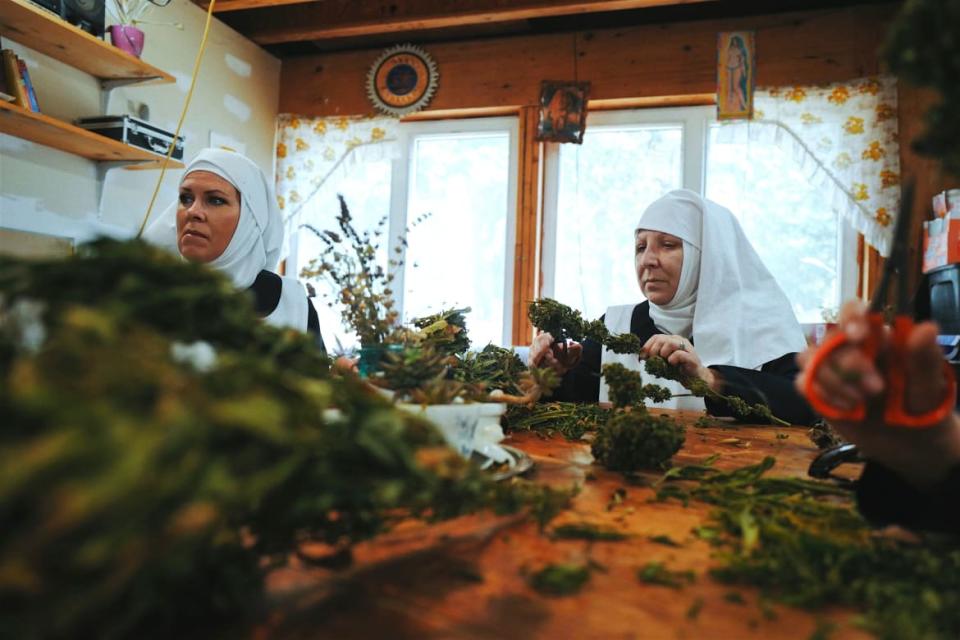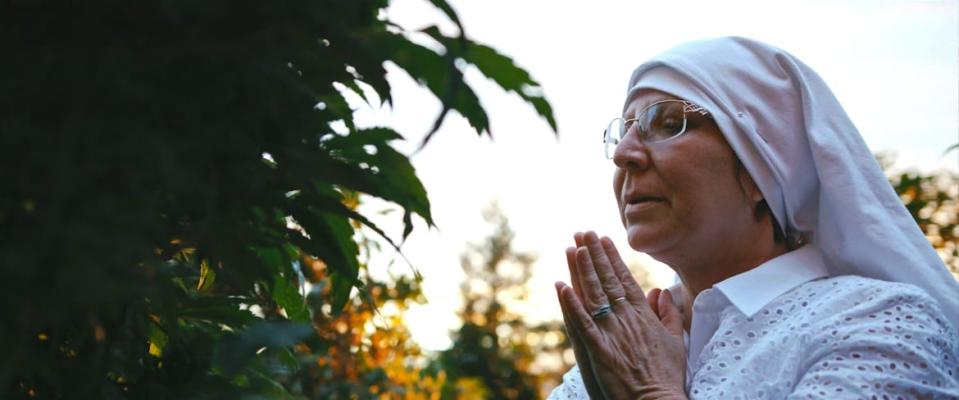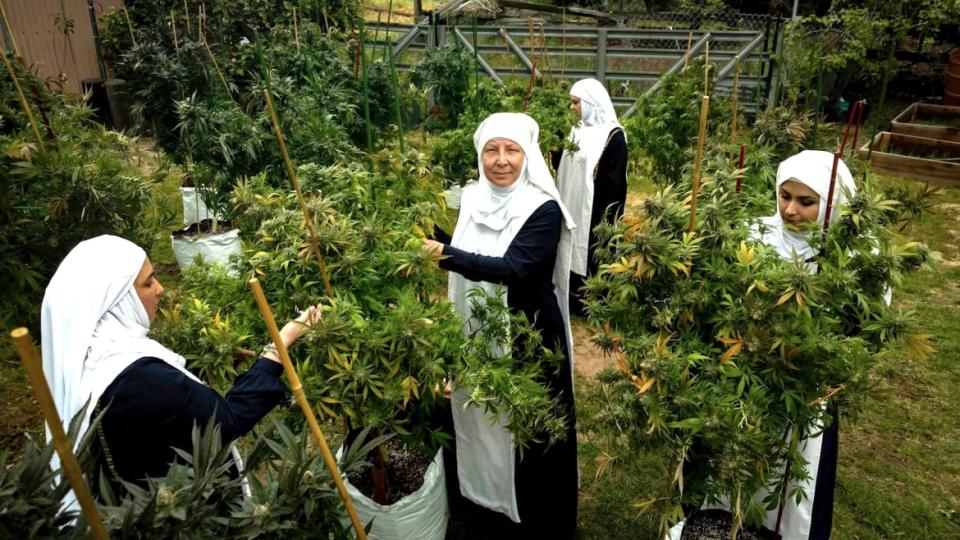The Saga of Sister Kate: A Fiery Weed Nun on a Mission to Heal the World

WEST HOLLYWOOD, California—In the ‘60s, Jim Morrison was evicted after dangling from a balcony by his fingertips. Keith Richards would regularly hurl television sets out of top-floor windows. And Robert Plant infamously shrieked, “I am a golden god!” while gazing at a billboard for Led Zeppelin’s new album Physical Graffiti. Yes, the Andaz hotel along Los Angeles’ Sunset Strip—formerly known as the “Riot House”—is steeped in debauched history.
Today the hotel, nestled behind privacy hedges, is decidedly less raucous yet still boasts remnants of its rock-and-roll past—from sculptures of guitars to oversized portraits of Hendrix, Mercury, and other legends gone by. But on a sunny spring day, guests would be forgiven for thinking the lobby’s citrus-infused water had been spiked with LSD, as their eyes fix on four nuns in habits pouring out of a silver Prius and into the former home to hell-raisers. These aren’t just any nuns, though—they’re the Sisters of the Valley, a spiritual weed-selling collective based out of Merced, California. The Sisters of the Valley specialize in cannabidiol salves and tinctures, which they move through Etsy, and would like to make it crystal clear that they are not in any way associated with Christianity.
“We do things spiritually but will not connect ourselves to any religion,” says Sister Kate, the owner and leader of Sisters of the Valley. “Religions just sell words. We want to do better than that.”
Sister Kate, 59, describes herself as a “self-declared, self-empowered anarchist-activist nun”—“anarchist” because, though she does fork over $140,000 every year to the tax man, she’s been running her business for four-and-a-half years without a permit from the county. Her story is told in thrilling detail in filmmaker Rob Ryan’s new documentary Breaking Habits, chronicling the woman formerly known as Christine Meeusen’s bogus journey from married mother of three to bullet-dodging weed nun.

It begins in Kentucky where, at the age of 32, Meeusen married Gary. The two were deeply in love, and soon after their nuptials he fell into the role of homemaker, she the breadwinner, running a successful consulting company. Christine and Gary had three children—Walter, Alex and Megan—and her work eventually took them abroad to Amsterdam. It was there that Christine, who’d voted for Ronald Reagan, transformed into a hardcore liberal.
“I spent eight years in Amsterdam, raised my children there, and I saw functional socialism living side by side with functional capitalism,” she tells me, speaking a mile a minute. “And America looks like a conquered people. We dress like a conquered people. And I think it’s a result of the caste system we’ve built where we’ve stacked the deck against the poor and not given them an equal playing field.”
In 2005, 13 years into her marriage, she discovered that her husband had been stealing money from her. “I told him, ‘Do I have to divorce you to find out where all my [money] is?’ and he said, ‘You do what you gotta do.’ That was the big realization where I thought, ‘Oh my god…he’s taken everything.’”
Christine stumbled upon a filing cabinet’s worth of papers outlining unauthorized transactions from 1998-2005. “It was about $1.1 million that the business had banked over 17 years,” she recalls. “He canceled our health insurance on the children, which was about $600 a month, and wired that money to his personal account in Switzerland so it looked like a transfer was going out for health care, because he did it the same day every month. He did other similar things, like paying the $4,000 rent we paid in Holland to the landlord and then again to himself. I was used to having the business pay about $7,000 a quarter on taxes, and he would put that money into his account and pay the IRS less.”
She shakes her head. “He made a full-time job out of lying, cheating and hiding money.”
If all that weren’t enough, her lawyer discovered that Gary had failed to annul his first marriage, making him not just a crook but a bigamist. With children ages 14, 13, and 11, it was “a terrible time to be poor,” but poor she was.
A few years later, in 2008, Christine was left with no other choice than to move in with her brother and his two children in Merced. The following year, she launched a co-op and began delivering medicinal cannabis—mostly to the poor and infirm. She knew the healing powers of cannabis firsthand, you see, having smoked a joint every night (at her doctor’s behest) in her early 40s to stave off the symptoms of early menopause. “It is my sacred calling,” she says.
Sister Kate was born in the fall of 2011—the morning the news broke that Congress had (supposedly) declared pizza a vegetable. “If pizza is a vegetable then I’m a nun,” she cracked. Her family then dared her to dress as a nun while they all attended an Occupy rally. There, she landed on the news, with those in the media branding her “Sister Occupy.”
The habit also served as her armor—a result, she says, of her history of shitty men. “I thought, well, I’m going to wear this because in this nobody’s going to hit on me, nobody’s going to try to victimize me, and nobody’s trying to make me stupid through orgasms—which happened in my previous relationships.” She laughs. “I always tell the girls, ‘Be careful: orgasms make you stupid.’”
A few months after that, however, she caught her brother conducting a black market weed deal in their home. “Some people just don’t realize that running a business is hard work,” she offers. “He thought that by year three the struggle would be over, and when the struggle wasn’t over, he was going to take things into his own hands.”
She lost it—and then her brother, she claims, got physical. As her son Andy remembers in the film, “I literally watched my uncle grab my mom by the neck and force her out of the house.”
“He throws me out, changes the locks, keeps my kids, and tells my kids not to talk to me at all for the next ten days while he’ll ‘handle’ me,” she says. “He made my family think I was crazy. It was gaslighting, it really was. I had to beg the police to help get my daughter out of there.”
Her two sons could return to college, but Sister Kate and her daughter were forced to couch-surf with other members of the Occupy movement. They were homeless for four months total before Sister Kate’s mother intervened, finding them a $1,000/month home in Merced.
It took Sister Kate a few years to get on her feet. A $140,000 settlement payment from her ex-husband wiped out her $100,000 in debt, and she used the remaining $40,000 to help start the Sisterhood. She’s since received another $240,000 that the IRS seized, but her fight against her lying ex isn’t over—she has a status hearing on May 6 and a court hearing in September. “I’m not done. It was $1.1 million and I got $380,000, and I’ve spent a lot of money on lawyers and forensic accountants. This isn’t finished.”
On January 1, 2015, she launched Sisters of the Valley—a cannabis company specializing in CBD salves and tinctures.
“We’re using medical cannabis strains that have had the THC bred out,” she explains. “It looks like a pot plant, it acts like a pot plant, it gets sticky like a pot plant, but when you test it, the THC is less than 2% and the CBD is around 12-15%, and that’s what we use to make our salves and our tinctures. By the time we’re done, the THC is less than 0.3% so it’s legally hemp, which allows us to ship it around the country.”
For the first nine months, she ran the business on her own, lighting sage before every CBD session, which follows the cycles of the moon—a tribute to the Native Americans. “I felt insane,” she says, laughing. “I used to call my kids in as witnesses to watch my rituals every night for the first nine months, so people didn’t say I was some fraud.”
After nine months, a woman named Darcy showed up at her door. She became the second Sister, and nine months after that, several more Sisters joined up.
The early days were rough. One night, she and her pal Zayn, whom she’d hired for security, spotted a group of masked men stealing her crops. A wild shootout ensued, with bullets whizzing by their heads. “It was insane,” she says. “There were two shooters and two people harvesting—we think. And it was just me and Zayn, and we just had this one little gun. We could’ve died. They tried to kill us. They shot at the gas tank under the trailer.”

She also has to deal with Merced County Sheriff Vern Warnke, a Yosemite Sam-like character who wears a revolver in a brown leather holster and hates marijuana. “I don’t believe for a minute that it heals anything,” he says in the film. “They’re drug dealers.” (The medical community begs to differ.)
“He’s nuts,” offers Sister Kate. “He tried to get the taxpayers to pay thousands of dollars so he could take horses from Merced to Washington, D.C., so he could pay tribute to Trump. He lives in a bubble of deniability.”
“Sheriff Warnke and his guys want cannabis to be illegal because it’s far easier for them to take down cannabis growers,” she continues. “If you were a cop, who would you want to take down? Real bad guys or plant-growing hippies? And the more they bust these people, the more tools they get—more guns and helicopters and the like.”
Sister Kate has modeled her Sisterhood on the Beguines, selfless laypeople who cared for the poor and sick during the Middle Ages, and were “focused on creating jobs for women.” She views Sheriff Warnke and his cannabis-burning ilk as barriers to progress.
“Imagine the king’s son has epilepsy, and our ancestral beguine mothers had cannabis in their pockets, and they had to watch the old white pasty guys with the leeches suck the blood out thinking that will help the epilepsy. We are them,” she says. “We’re trying to heal the world and change the laws that victimize the marginalized.”

The Sisters of the Valley set aside 5% of every batch to give to those too poor to afford it, and the business has grown steadily. In its first year—with only Sister Kate—they did $60,000 in sales. The following year, with Darcy, it rose to $750,000. Then $1 million. Last year? $1.1 million. There are eight Sisters who currently work at the farm—and three who live there, with more moving in soon. “We’re now focused on getting a six-hour work day, taking more time to read, sing and dance, and getting other Sisterhood enclaves up and running,” says Sister Kate. “All our extra money goes into seeding other orders. We’re not getting rich here.”
According to Sister Kate, she’s personally ordained over 20 Sisters of the Valley; and in addition to California, there are Sisterhoods in Canada, New Zealand, the U.K. and Brazil, with more coming soon in Denmark and Spain. “They all have ordination powers and they’re bringing in Sisters right and left, so I’m not necessarily keeping track of them all,” she explains. “They make our medicines, and our thing with the expansions is, treat us like the Mormons and pay 10% back to the Mothership, and then you can use the label and everything else.”
“Our mission,” she states, “is to have weed nuns in every town and province across the planet in the next twenty years.”
With that our conversation is over, and, after kindly asking for a restaurant recommendation, the five weed nuns set off on foot down Sunset Boulevard in search of sustenance.
Got a tip? Send it to The Daily Beast here

 Yahoo News
Yahoo News 
